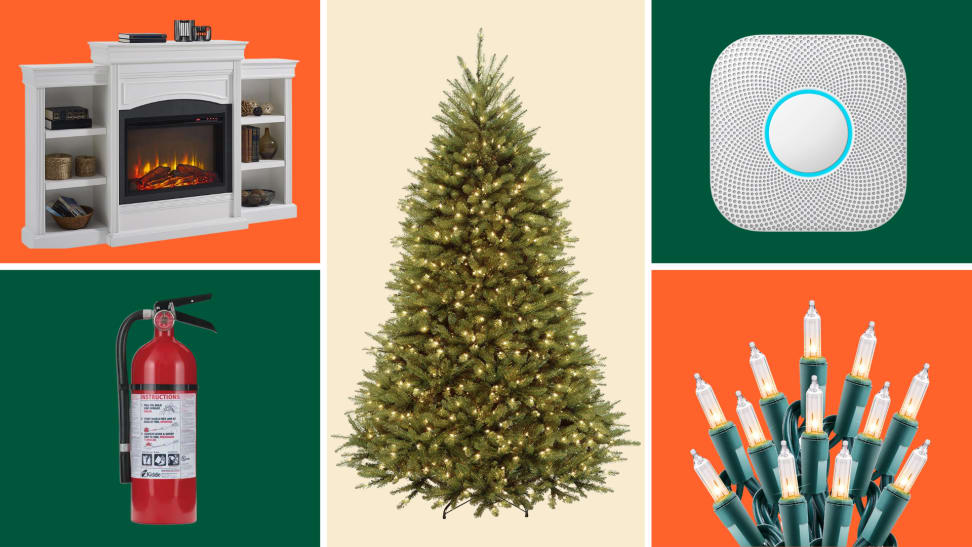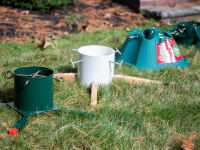Here's your go-to guide for holiday home safety
Stay injury- and fire-free in the most festive months of the year.
 Credit:
Reviewed / Amazon / Nest / National Tree Co. / Kidde / Minetom
Credit:
Reviewed / Amazon / Nest / National Tree Co. / Kidde / Minetom
Products are chosen independently by our editors. Purchases made through our links may earn us a commission.
Ah, the holidays. Between the social events, the shopping, and the traveling, the holidays are stressful enough; no one wants to add “fire damage” or “lasting physical injury” into the already-packed calendar.
Fire departments and police departments are at their busiest during the holidays, so be prepared this season by following these recommended holiday safety tips.
These holiday safety tips will help keep your home safe and avoid having to spend time in the ER when you’d rather be enjoying your holiday celebrations.
Halloween: Avoid fires and make sure your path is clear
1. Minimize real-flame candles
Stay away from the pyrotechnics as much as possible, even if you’re just lighting tea candles to sit inside your jack-o-lanterns. The National Fire Protection Agency recommends that you always use battery-operated candles or glow sticks.
Corn stalks, crepe paper, and other spooky decorations are often extremely flammable. Be sure to keep all decorations as far from sources of heat from candles to space heaters.
2. Make sure you can walk—and see—in your costume
We all love a great Halloween costume, but try to be safe when doing so. Costumes with long trains of fabric or ones that block your regular or peripheral vision present a tripping hazard when you’re running from house to house.
Plus, some store-bought costumes are extremely flammable. Shop for costumes with a fire resistant label.
3. Don't sacrifice your fire alarm for your smoke machine
Nothing creates a spooky atmosphere better than some dry ice or a smoke machine, but these also tend to set off smoke detectors. Please do not turn off your fire alarms, because if an actual fire does break out, they may prove to be life savers.
4. Make a haunted house, not a death trap
If you’re setting up a haunted house, be sure that there are multiple exits clearly marked, and that the paths to those exits are clear. Getting lost in a haunted maze can be fun, but if you can’t escape it in an emergency, it really can turn into a house of horrors.
Thanksgiving: Keep kitchen disasters to a minimum
According to the NFPA, unattended cooking is the leading contributor of cooking fire and fire deaths on Thanksgiving.
Additionally, out of the entire year, Thanksgiving is the day with the highest number of home cooking fires. Make sure to follow holiday safety tips like testing your smoke detectors before the cooking begins.
1. Know that turkey fryers are a fire hazard
The NFPA advises against using turkey fryers, since they are a massive fire hazard. If you don't want to stick to safely roasting one, you've got a number of options, from braising to smoking. You can even cook one in an air fryer (see the Breville Smart Oven Air).
If you still must fry a turkey, please do it well away from your home, and have (and know how to use) multiple fire extinguishers.
2. Make the kitchen a safe zone
Another holiday safety tip is do not leave food that is cooking on a stovetop or in an oven unattended. Stepping away for even a few minutes can result in a quickly growing kitchen fire.
You'll also want to keep children away from cooking food (unless carefully supervised), or any utensils or food preparation tools with sharp blades. It just takes one moment of inattention for a kid to be splashed with hot oil or to get cut with a knife that is meant to cut through meat.
Lastly, big holiday meals with lots of slow cookers and appliances can mean cords in high-traffic pathways. Make sure the kitchen, table and major socializing areas are free of tripping hazards, so no one ends up with a twisted ankle or covered in hot soup.
Hanukkah, Kwanzaa, Christmas, and Winter Solstice: Be careful on ladders and with electricity
1. Remember that your Christmas tree is highly flammable, especially when it's dry
Christmas trees, whether they’re real or fake, are extremely flammable. Be sure to keep them at least three feet away from any heat sources, including baseboard heating, space heaters, and candles.
For real trees, the better watered it is, the less flammable it is.
2. Don't leave your menorah or any other lit candles unattended
Make sure to keep an eye on any lit candles, whether they're on a menorah, a kinara, an advent wreath, or a dinner table centerpiece. Candles can fall over, and hot wax can drip down from candle holders and ignite any number of flammable objects, from pine boughs to tablecloths to wrapping paper.
3. Use a fireplace as intended
Do not toss anything in a fireplace or wood-burning stove that’s not supposed to be there. Additionally, do not leave fireplaces unattended—especially immediately after adding logs to the fire.
Be sure to have your chimney flue serviced before you actually start using the fireplace for the winter season. Santa may not care if the chimney’s blocked up, but without a safe place to vent the hot air, your fireplace is a fire hazard waiting to happen.
Lastly, make sure to hang decorations a safe distance away from the fire in your fireplace. It’s pretty easy for a stray spark to ignite a stocking.
4. Proceed with caution when hanging holiday lights and adding decorations to your roof
We understand that you really want to put a replica of Santa’s sleigh and reindeer up there, but if you can skip the roof decorations, please do so. Thousands of people are hospitalized each year around the holidays due to falls from the roof or from ladders.
If you really must get up onto the roof, keep an eye out for icy spots, be sure to wear boots with strong treads or grips, and be sure to be sure to have someone holding the ladder while you’re standing on it. Also make sure that the ladder’s support struts are locked in place, and do not stand on the ladder's top step. Move very, very carefully while you’re up there!
In general, having a second pair of eyes while you hang lights or decorations outside isn’t a bad idea. If something does happen, it helps to have someone else around who can dial 911.
When plugging in outdoor lights, make sure you're using specific outdoor plugs; with wind, water, and snow, extension cords from indoor outlets might not be up to snuff.
5. Don't overload your circuits with plugs and keep extension cords out of high traffic areas
Between the lights, the decorations, and new gifts, it is easy to overload the circuits in your house. Avoid plugging multiple power strips or extension cords into one another.
For devices that draw lots of power, like hair dryers, coffee makers, and space heaters, don’t plug any other devices into those wall outlets.
Another holiday safety tip is to make sure the areas around power strips and outlets are free of any flammable materials. If there’s a power surge, sparks from the outlet could ignite anything nearby.
If you have a GFCI outlet—that’s one of the outlets that has the “test” button on it—those outlets have a safety feature where they shut off when they sense too much power is being drawn. If a specific outlet has turned off more than once, that’s a signal that too many things are plugged into that outlet. Unplug everything, and see if you can use another outlet around the house.
A number of injuries are also caused by extension cords. If you do use extension cords for holiday decorating, make sure the cords are tucked along walls or are otherwise out of the way. Do your best not to stretch them across doorways, stairs, or other regular access points.
And if you're using an extension cord outside, make sure it's an outdoor extension cord made for the elements.
6. Know how to properly clean broken ornaments
Not everyone buys the expensive glass or metal baubles to adorn their tree, but if you have them, and they fall and break, be sure to sweep up or vacuum up as much as possible. Slivers of glass or metal can stab your feet, or be ingested by unknowing kids or pets. Nobody wants glass in their belly.
New Year’s Eve: Fireworks can cause harm
1. Beware of sparklers when ringing in the new year
Remember that fireworks are dangerous, although we all love playing with them. A number of firework-related injuries occur each year, including the most benign of them all: sparklers.
When you’re setting off fireworks (assuming it’s legal in your state), make sure that you’re setting them off in a flat, wide-open space that is largely dirt or pavement, since fireworks can easily ignite dried grass.
Additionally, keep fireworks safety items on hand, like a bucket of water, a hose, and a fire extinguisher.
If something goes wrong, you can put out the fire quickly. If your fireworks display is successful, you should douse all of the used or dud fireworks before tossing them out.


